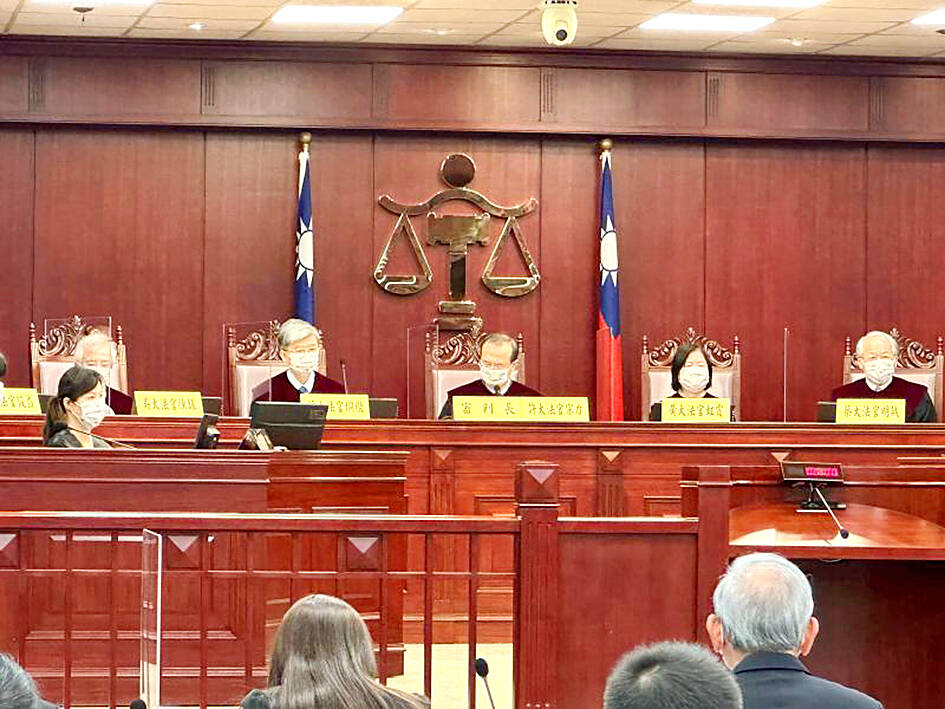The Constitutional Court on Monday said in a judgement that a rule governing how appeals in criminal cases are allotted to Supreme Court judges does not violate the Constitution, narrowing hopes for retrials for 35 people on death row.
Fifty-two people, including 35 people who have been sentenced to death, requested an interpretation of the Supreme Court’s case allotment rules, which stipulate that serious criminal cases appealed to the Supreme Court after being sent back to lower courts at least twice must be heard by the same judge who heard them previously, unless that judge has left the court.
The rule is intended to ensure that appeals do not take too long by having a presiding judge who is familiar with the case.

Photo: CNA
The petitioners argued that the rule contravened their constitutional right to a fair trial.
However, the Constitutional Court said that requiring the same judge to hear such cases did not contravene the right to appeal as stipulated in Article 16 of the Constitution.
Judges should recuse themselves if they are selected to hear an appeal of a case in which they have previously participated in issuing a verdict, it added.
The Constitutional Court gave the legislature two years to amend recusal laws in the Code of Criminal Procedure (刑事訴訟法).
If the court had ruled in favor of the petitioners, the 35 people on death row who had cases allotted according to the rule might have been eligible for retrials.
In related news, the Ministry of Justice on Monday said that it was currently unable to carry out executions, as the 38 people on death row have a separate petition pending before the Constitutional Court.

Taiwan is to commence mass production of the Tien Kung (天弓, “Sky Bow”) III, IV and V missiles by the second quarter of this year if the legislature approves the government’s NT$1.25 trillion (US$39.78 billion) special defense budget, an official said yesterday. Commenting on condition of anonymity, a defense official with knowledge of the matter said that the advanced systems are expected to provide crucial capabilities against ballistic and cruise missiles for the proposed “T-Dome,” an advanced, multi-layered air defense network. The Tien Kung III is an air defense missile with a maximum interception altitude of 35km. The Tien Kung IV and V

The disruption of 941 flights in and out of Taiwan due to China’s large-scale military exercises was no accident, but rather the result of a “quasi-blockade” used to simulate creating the air and sea routes needed for an amphibious landing, a military expert said. The disruptions occurred on Tuesday and lasted about 10 hours as China conducted live-fire drills in the Taiwan Strait. The Civil Aviation Administration (CAA) said the exercises affected 857 international flights and 84 domestic flights, affecting more than 100,000 travelers. Su Tzu-yun (蘇紫雲), a research fellow at the government-sponsored Institute for National Defense and Security Research, said the air

Trips for more than 100,000 international and domestic air travelers could be disrupted as China launches a military exercise around Taiwan today, Taiwan’s Civil Aviation Administration (CAA) said yesterday. The exercise could affect nearly 900 flights scheduled to enter the Taipei Flight Information Region (FIR) during the exercise window, it added. A notice issued by the Chinese Civil Aviation Administration showed there would be seven temporary zones around the Taiwan Strait which would be used for live-fire exercises, lasting from 8am to 6pm today. All aircraft are prohibited from entering during exercise, it says. Taipei FIR has 14 international air routes and

Taiwan lacks effective and cost-efficient armaments to intercept rockets, making the planned “T-Dome” interception system necessary, two experts said on Tuesday. The concerns were raised after China’s military fired two waves of rockets during live-fire drills around Taiwan on Tuesday, part of two-day exercises code-named “Justice Mission 2025.” The first wave involved 17 rockets launched at 9am from Pingtan in China’s Fujian Province, according to Lieutenant General Hsieh Jih-sheng (謝日升) of the Office of the Deputy Chief of the General Staff for Intelligence at the Ministry of National Defense. Those rockets landed 70 nautical miles (129.6km) northeast of Keelung without flying over Taiwan,